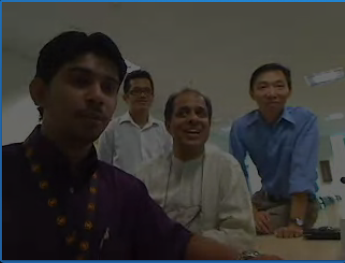This was the opening Skype meeting between the principals (Les Cottrell and Norm Ringgold at the SLAC end), and the UNIMAS leader (Narayanan Kulathuramaiyer nara@fit.unimas.my) together with others at the UNIMAS end. The goals are to explore interests at each end, set expectations, specify how this works in more detail.
Introduce ourselves and our roles.
UNIMAS
Mohamad Imran Bandan - purple shirt, Narayanan Kulathuramaiyer - glasses, Adam - White shirt, Tan - Blue Shirt
Nara: Dean of Faculty, look after CS & IT, main agency working with SLAC
Tan: Dept of computation network staff head
Imran: Talking to most, a lecturer network group
Adam: Systems analyst, technical person
A Dr Johari will be joining the UNIMAS team, He is a senior lecturer in the UNIMAS faculty, also from network group. He will start joining us starting July after completing his Phd study leave.
SLAC
Norm |
Les |
|---|---|
|
|
Norm: Head of IT operations for SLAC
Les: manager of Networking and Telecommunications, leader of PingER project, see http://www.slac.stanford.edu/~cottrell/
The SLAC National Accelerator Laboratory is operated by Stanford University for the U.S. Department of Energy's Office of Science. SLAC is a department of Stanford. We are Stanford employees.
Expectations
SLAC
Students have a local superviser in Kuching
We start with a couple of graduate students interested in network monitoring.
- They learn about the PingER and other projects
- They work on assigned tasks working in Kuching
- We meet regularly (e.g. weekly) via phone (Skype) to review progress.
- Meeting includes Les at SLAC, any Kuching students at SLAC, students and supervisor in Kuching
- Daily emails, skype calls & instant messaging to keep in contact
- Tasks will involve programming (typically in perl) of network measurements, analysis and presentation (GUIs) of information
The best of the best graduate students are invited to SLAC for 1 year as an intern/visiting scientist
- Up to 2 students at a time
- They will work together with the SLAC team on projects such as PingEr, perfSONAR
- Depending on the student there may be opportunities for presentations, talks, and contributing to publications
They are funded by Kuching
If interested then fairly early on it would be good to have a face to face meeting in Kuching and/or SLAC to go over expectations, do some publicity, introductions etc.
UNIMAS
One project of interest to UNIMAS is bringing networking and Internet access to remote areas such as the Kelabit highlands. There are many challenges, not the least of which is the lack of power. They have a VSAT connection. The bandwidth is very limited, but they are very excited about the Internet access and are quickly seeing the need for more. They are working on solar based repeaters and using wireless in the longhouses. They are looking at a solar based power system. The standard solutions needed customizing.
An interesting synergy would be to provide monitoring of the remote networks from Unimas. The monitoring would provide an historical record of performance (round trip times, jitter, loss), reachability etc. Based on this a case study could be put together to identify problems in particular the reliability (e.g. MTBF, uptime, MTTF), how congested the connection is, identify problems and possibly identify the causes.
A further step might be along the lines of deploying an ePingER monitoring station in the remote regions. Its low power requirements and low cost together with the ability to host applications such as a web accessible PingER monitoring station, could be very advantageous to quantitatively study the network performance, and provide reports for decisions makers and funding agencies on how to improve the network.
Is there a match?
There appears to be excitement and interest.
- Dr. Tan will lead future meetings at the UNIMAS end.
- Imran will continue to support the PingER monitor at UNIMAS, and provide technical help. At some time in the future I believe I heard he will be starting a PhD.
- It might be interesting and easy to add to the UNIMAS PingER monitor monitoring of nodes in remote regions of Eastern Malaysia. When a reasonable amount of data has been gathered then a case study could be be made of the connections to the remote sites, to identify and compare the performance.
- A next step is to further engage the UNIMAS vice chancellor. Nara has already talked with the VC, The VC was unable to make this Skype meeting, but we will need to set one up for him to meet with the SLAC end. this would be a good time to discuss resources etc.
- Les will send some ideas for projects/tasks. A first cut is available.
Next meeting
Will be in 2 weeks time on Thursday 5th July 8pm Pacific Daylight Time, Friday 6th July 11am.
Future
Are there resources and what for:
- Funding for students as time goes goes on as becomes clearer, then seek student & grants
- Funding for face to face start up visits. Spoken to vice chancellor, Skype call between SLAC ann VC at a later time. Schedule a meeting to discuss resources. Visit to SLAC Internal discussions
Consult higher education for funding
- Funding for extended (1 year) internships at SLAC
What kind of students – graduate, BS, MS, PhD …
What are student interests?
- Building network monitoring tools tools (measurement, analysis, GUIs)
- Analyzing data, producing case studies
- Research, writing papers
Identify students
Face to face visits and discussions
Selecting students as interns at SLAC for 1 year and funding
Communications:
- Computing requirements, accounts at SLAC
- Interim email lists and SMS txt messages
- Documentation respository (probably use the SLAC wiki)
- Follow on meetings would include identified students, progress reports etc.


